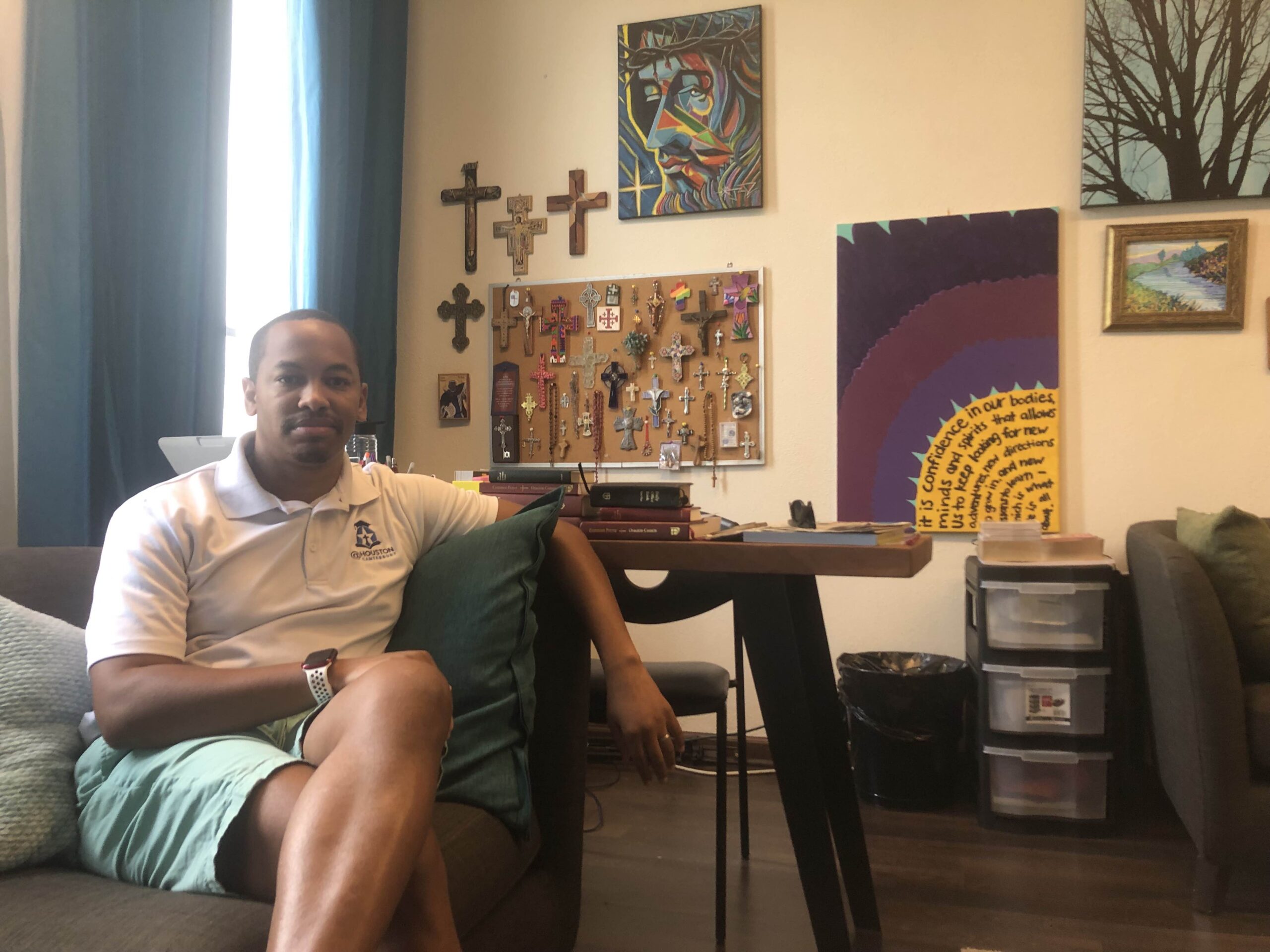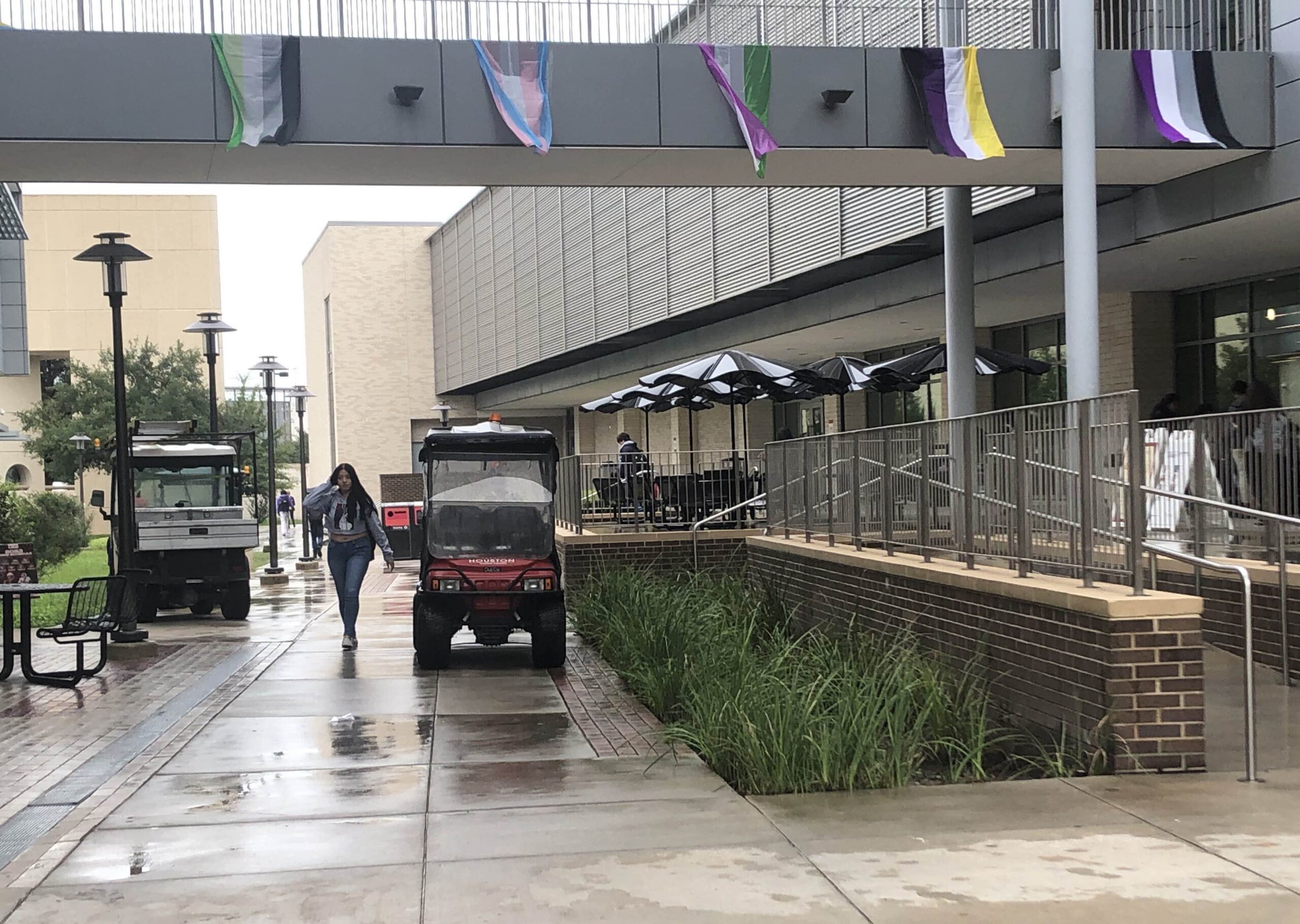At the University of Houston, students and faculty alike are still reeling from the impacts of Senate Bill 17. The law, which was approved by the state Legislature earlier this year, effectively banned campus programs that catered to diverse student populations.
For many students, the worst impact of SB 17 was losing the LGBTQ+ Resource Center. Under the law, the center was recently merged with the Center for Diversity and Inclusion to form the newly created “Center for Student Advocacy and Community.” But even amidst what seem like insurmountable odds, student leaders and faculty are fighting back. From helping LGBTQ+ students access aid to mounting protest movements, they’ve proven unwilling to give up.
The impact of the Resource Center’s closure has led to “terror and outrage” amongst students, according to Kaitlin Tolman, UH senior and president of LGBTQ+ student organization GLOBAL.
“Having that heart of the community go away is just devastating and it’s left so many people completely heartbroken,” Tolman told the Texas Observer.
“Having that heart of the community go away is just devastating and it’s left so many people completely heartbroken.”
As an LGBTQ+ student leader, she made frequent use of the center for a wide variety of events, from ice cream socials to candid talks about struggles with identity.
Tolman said it was a place that was frequently filled with laughter, warmth, and sometimes tears. Most importantly, they said that students found their home there:
“It was a central hub for the community. People connected, they established their foundation at the Uuniversity there. It was like a chosen family.”
Tolman also recalled how, even in unprecedented moments of grief, the compassion of Resource Center staff held their community together.
When Corey Sanders, former vice president of GLOBAL and a notable student leader in both the Black and LGBTQ+ communities, passed away in October of last year, Tolman and others were left reeling. As they scrambled to try to hold together their own emotions and organize the logistics of his funeral, the Resource Center became a rock to stand upon. Tolman said that within a day of his passing, staff had offered not only to host Sanders’ memorial but to help organize it.
While Senate Bill 17 is now set in stone, campus activists have been anything but compliant. In the wake of what she termed “an unprecedented attack on queer rights,” Tolman and others did what they knew how to do best: they organized.
UH officially ceased the LGBTQ+ Resource Center’s activities on September 1, 2023. But even before that point, student activists were hard at work trying to find a replacement.
GLOBAL partnered with a variety of other student organizations, sympathetic faculty, and even other colleges to try to create a “safety net” for queer students impacted by the bill’s passage. The “safety net” would not fully restore the programs removed by SB 17, but it would try to continue the same programs through student-led organizations and other groups not bound by state law.
While some of these groups are fairly typical, including Rice University Pride and the UH LGBTQ+ Alumni Network, students have also found an unexpected ally standing alongside them: the church.
Many LGBTQ+ students are more likely to wince than to grin when religion is brought up. Years of oppression at the hands of religious leaders and organizations is not an easy legacy to shake off, especially in the Bible Belt. But the University of Houston is actually one of only four universities in the country to host an interfaith religion center. At the A.D. Bruce Religion Center, Muslims, Jews, Hindus, and other religious groups mingle freely in a way that’s rarely seen elsewhere.

Charles Graves, a priest who serves as the campus minister for the local Episcopalian ministry Houston Canterbury, quipped that the University’s unique situation was “Like those old jokes you hear where a rabbi, a priest, and a sheikh walk into a bar, except here it really happens.”
Graves has been involved in Houston’s campus ministry since 2019. He is also openly gay, something that he says has deeply impacted every aspect of how he approaches the idea of ministry.
“I went to Hampton University [in Virginia] for undergrad. At the time, it was not a place where I could be openly gay myself,” Graves said. “I basically ended up going back into the closet for the three years I was in college because of how intense the pressure was.”
Since Graves was raised in an affirming Episcopal church, he said that he actually had not heard a homophobic sermon until he entered college. But the experience shook him enough that he decided he wanted to help make sure no other college students had to feel that way.
“That’s not what Christianity has to look like,” Graves told us. “The way that my theology works is I believe more than anything that the Jesus I love represents love and care. Loving your neighbor means loving all your neighbors, full stop.”
As Graves spoke passionately about campus ministry, he gestured to the various rainbows decorating the corners of his office. While the space was decorated with dozens of crosses, the multitude of pride flags made it look like anything but a typical church.
“Loving your neighbor means loving all your neighbors, full stop.”
Joining Houston Canterbury are four other religious organizations: Houston Hillel, United Campus Ministries, and Houmin. These four groups, loosely dubbed the “Affirming Campus Ministries,” created a partnership in the wake of SB 17 to minister to LGBTQ+ students.
Though their plans have not been finalized yet, Graves was sure to emphasize their desire to create a safe space for students as they attempt to carry on the legacy of the LGBTQ+ Resource Center. Since they are not university employees, they are not restricted by SB 17.
“Our friends in the Legislature love to speak of the right to religious freedom,” Graves said with a slight smirk. “So it’s kind of fun to use those rights in a way they might not have anticipated.”
While much of the response to SB 17 has been focused on mitigating the impact of the law, some students have chosen to take a more direct approach. As the dust settled, a student coalition came together to do more than just damage control: They came to fight.
“Free UH,” as the movement came to be known, was the brainchild of Tolman and Harrison Martin, a representative of the Young Democratic Socialists of America.
Drawing on a history of student activism including Students for a Democratic Society and other groups active in the 1960s, Martin initiated the movement with the goal of forming a student walkout and halting the university until their demands were met.
“The university has had a lot to say about how they’re going to help queer-plus students now that the Resource Center is gone,” Martin said. “But actions speak louder than words, and this is the time for action.”
“Actions speak louder than words, and this is the time for action.”
Free UH has partnered with a wide variety of other organizations, with demands ranging from a return of Diversity Equity and Inclusion programs to support for graduate student pay increases. They plan to host several walkouts if the university does not meet their demands.
On October 20, the group delivered a petition to UH Chancellor Renu Khator’s office with the demands listed above. They plan to walk out on October 26 if their demands are not met, with additional protests to happen statewide on November 15.
While she’s not directly affiliated with the Free UH movement, few represent its unabashed passion as well as Associate English Professor Marie Gonzalez. Gonzalez, who is the faculty sponsor for GLOBAL, spoke candidly about her efforts over the years to push for women’s and LGBTQ+ rights.

“I’ve been here since 1991. Back then, the Women’s Resource Center was in a basement,” Gonzalez told the Observer. “We kept fighting, and eventually it merged with the LGBTQ+ Resource Center and we got that beautiful space in 2010. And now we’re right back where we started.”
Gonzalez was one of the first openly gay professors at the University of Houston. She recalled how, at one point in the late ’90s, she was asked to change her place setting at an event from “Marie Gonzalez and partner” to “Marie Gonzalez and guest.”
Gonzalez has offered up classrooms in the English building for students to host events now that the Resource Center is gone. She said it can be easy to get disheartened as she watches the hard work of activists get rolled back, but she encouraged queer students to stop and really take in all the people fighting for them.
“You’re winning, that’s why they’re going after you. I say you should wear it as a badge of honor,” Gonzalez said. “Double down, do even more. Be far more queer, far more flamboyant. At the end of the day, they’re fighting this hard because they know we’ll win in the end.”
Correction, October 27, 2023: A previous version of this story incorrectly spelled Katy Tolman’s last name. Additionally, we incorrectly stated Charles Graves’ denomination as Lutheran. He is an Episcopal minister.







